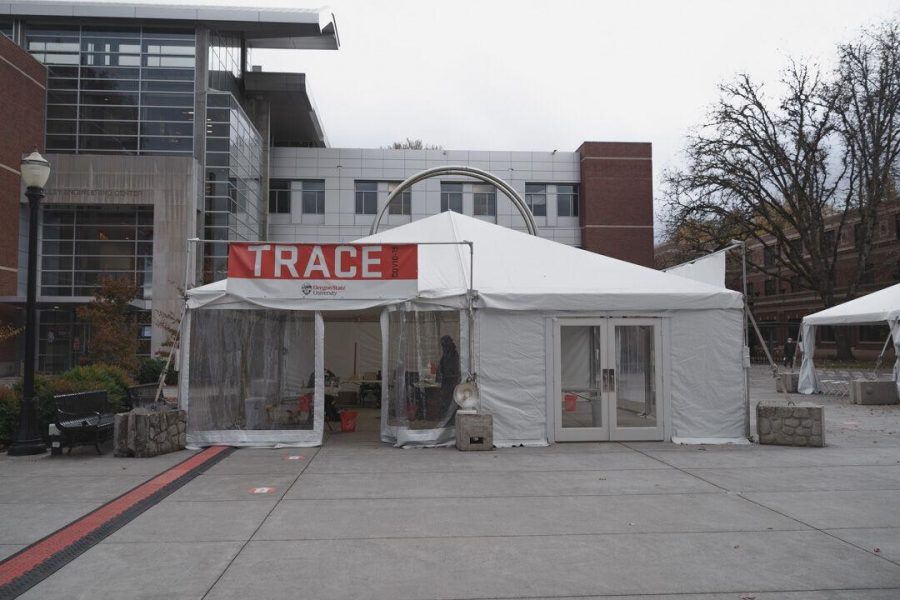COVID-19 testing continuously available to OSU community; TRACE Project offering free testing before holidays
November 15, 2020
Oregon State University, together with Benton County health officials and TRACE-OSU, are working steadily to provide information and testing for those that need it. TRACE-OSU centers are testing hundreds of volunteers weekly.
On Nov. 6, Dan Larson, vice provost for student affairs, sent an all-students email, stating that “In addition to weekly surveillance testing through TRACE-OSU, OSU students who live in the Corvallis or Bend areas will be invited to obtain a free [COVID-19] test the week of Nov. 16.”
The invitation for the test will be sent through a QR code, which students will then use at the TRACE-OSU website. “Results will be returned within three business days, meaning those who participate will have their test results by Tuesday, Nov. 24,” Larson said.
Project Baseline, a community-based testing initiative, is also offering free tests at Rite Aid Drugstores for anyone in Oregon, Washington, California and other select states.
Funded by the Packard Foundation, Pacific Source Health Plans and OSU, TRACE-OSU is a program that measures the prevalence of COVID-19 between OSU’s faculty, staff and students. As stated by Justin Sanders, assistant professor of research, “this term we have sampled community members for a total of over 7,500 tests.”
The on-going initiative that started back in April, aims to determine the prevalence of the virus that causes COVID-19, which includes door-to-door sampling in Corvallis, Bend, Newport and Hermiston.
“TRACE-OSU uses the supervised self-collection of nasal swabs from OSU community members. We then use a type of test called a nucleic acid amplification test (or NAAT),” Sanders said. “More specifically, this is a test that uses reverse-transcription polymerase chain reaction (RT-PCR) to amplify and detect pieces of the SARS-CoV-2 viral genome.”
According to Dr. Chunhuei Chi, professor at the Global Health Program, the RT-PCR is so far the most accurate form of testing antigens, and tests whether the person is currently infected
There are so many laboratories producing these testing kits, that they end up having different qualities,” Chi said. “By quality, we are concerned about two issues; false negative and false positive. The high-quality kits will have 99% or higher accuracy, and the poorer quality ones will have below 95%, therefore a higher chance of showing false negative or false positive.”
Chi also said that there’s another category of testing, the antibody test, which has two ways of detecting COVID-19; IgM and IgG. IgM tests if the person has been recently infected in recent weeks, while IgG tests whether the person has been infected in the past month or two.
The Benton County Public Health Department and the Oregon Health Authorities utilize the results from these kinds of tests —usually RT-PCR— to understand and prevent the spread of SARS-CoV-2 in Benton County and the OSU community by doing effective tracing.
“OSU’s faculty have developed a test kit that participants can quickly, easily and safely administer themselves,” Sanders said. “Collected samples are tested for the presence of SARS-CoV-2 and participants obtain their confidential test results within 48 hours.”
Behind the logistics of how TRACE OSU tests the community, Steve Clark, vice president of university relations and marketing, said “1,000 or more students, staff, and OSU faculty are invited each week to be tested on the Corvallis campus.”
TRACE OSU also analyzes wastewater campus buildings throughout the week for the presence of COVID-19. According to OSU’s database website, concentrations of COVID-19 in water from Corvallis, Cascades and Hatfield Marine campuses has been low – on a scale from low to strong.
“Every other week, students and OSU employees are invited to be tested on the OSU-Cascades campus and at the Hatfield Marine Science Center in Newport as well.” Clark said. Wastewater is also tested weekly at the Bend and Newport campuses.
Clark encourages all OSU students, faculty and staff to enroll in the TRACE-OSU project; by doing so, they can help protect the entire community as well as themselves. Once a person enrolls for TRACE, an invitation to be tested may be sent soon
Corvallis testing locations are at the Reser Stadium ticket booths and in Johnson Hall Plaza next to Kelley Engineering Center.
To get tested with the TRACE-OSU program, one must be either a faculty member, a student or staff at OSU. If interested in learning more about how to enroll in their program, follow the steps on TRACE-OSU’s website.
























































































































